Top Rankings
Sitka School District ranks among the top 20% of public school district in Alaska for:
Category
Attribute
Overall Rank
Highest overall rank (Top 20%)
Math Proficiency
Highest math proficiency (Top 20%)
Reading/Language Arts Proficiency
Highest reading/language arts proficiency (Top 20%)
Science Proficiency
Highest science proficiency (Top 10%)
Diversity
Most diverse schools (Top 1%)
For the 2025 school year, there is 1 public preschool serving 160 students in Sitka School District.
Public Preschools in Sitka School District have a diversity score of 0.69, which is less than the Alaska public preschool average of 0.72.
Minority enrollment is 52% of the student body (majority American Indian and Hispanic), which is less than the Alaska public preschool average of 57% (majority American Indian).
Overview
This School District
This State (AK)
# Schools
6 Schools
313 Schools
# Students
1,143 Students
74,752 Students
# Teachers
95 Teachers
4,173 Teachers
Student : Teacher Ratio
12:1
12:1
District Rank
Sitka School District, which is ranked within the top 20% of all 53 school districts in Alaska (based off of combined math and reading proficiency testing data) for the 2021-2022 school year.
The school district's graduation rate of 75-79% has stayed relatively flat over five school years.
Overall District Rank
#7 out of 53 school districts
(Top 20%)
(Top 20%)
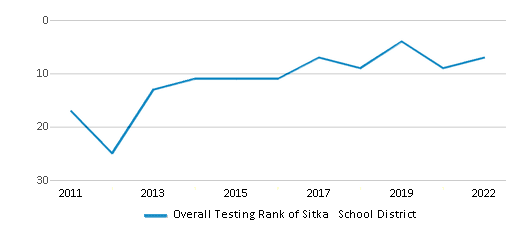
Math Test Scores (% Proficient)
37%
23%
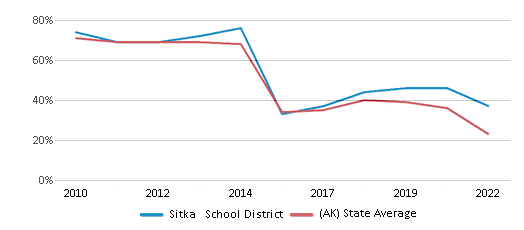
Reading/Language Arts Test Scores (% Proficient)
40%
29%
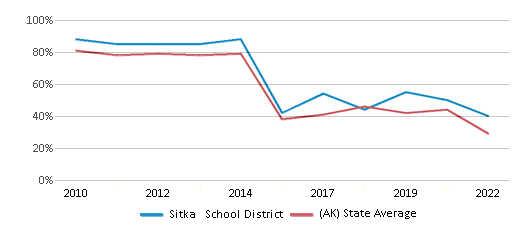
Science Test Scores (% Proficient)
55%
38%
Graduation Rate
75-79%
78%
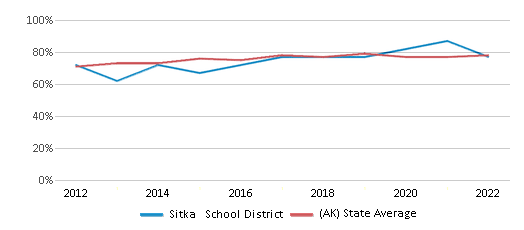
Students by Ethnicity:
Diversity Score
0.69
0.72
# American Indian Students
248 Students
19,737 Students
% American Indian Students
21%
27%
# Asian Students
91 Students
3,310 Students
% Asian Students
8%
5%
# Hispanic Students
78 Students
5,412 Students
% Hispanic Students
7%
7%
# Black Students
8 Students
1,719 Students
% Black Students
1%
2%
# White Students
559 Students
32,279 Students
% White Students
49%
43%
# Hawaiian Students
9 Students
2,470 Students
% Hawaiian Students
1%
3%
# Two or more races Students
150 Students
9,825 Students
% of Two or more races Students
13%
13%
Students by Grade:
# Students in PK Grade:
11
3,308
# Students in K Grade:
85
8,074
# Students in 1st Grade:
80
8,486
# Students in 2nd Grade:
81
8,694
# Students in 3rd Grade:
61
8,104
# Students in 4th Grade:
75
8,234
# Students in 5th Grade:
77
8,150
# Students in 6th Grade:
88
5,346
# Students in 7th Grade:
97
2,858
# Students in 8th Grade:
76
2,887
# Students in 9th Grade:
111
2,542
# Students in 10th Grade:
92
2,451
# Students in 11th Grade:
114
2,702
# Students in 12th Grade:
95
2,916
# Ungraded Students:
-
-
District Revenue and Spending
The revenue/student of $25,276 is higher than the state median of $20,163. The school district revenue/student has stayed relatively flat over four school years.
The school district's spending/student of $23,743 is higher than the state median of $21,240. The school district spending/student has stayed relatively flat over four school years.
Total Revenue
$29 MM
$2,630 MM
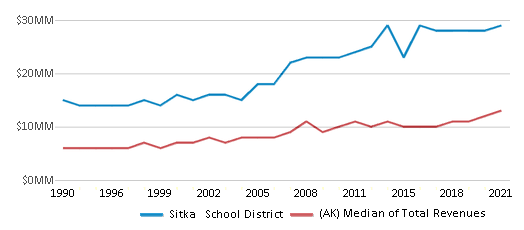
Spending
$27 MM
$2,771 MM
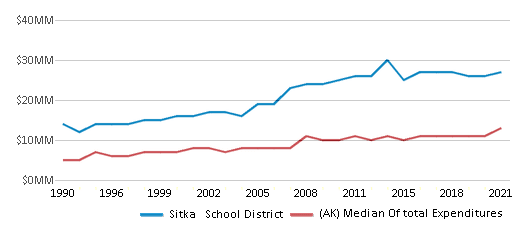
Revenue / Student
$25,276
$20,163
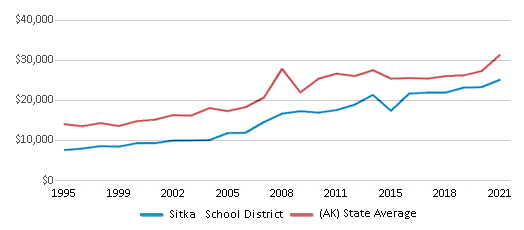
Spending / Student
$23,743
$21,240
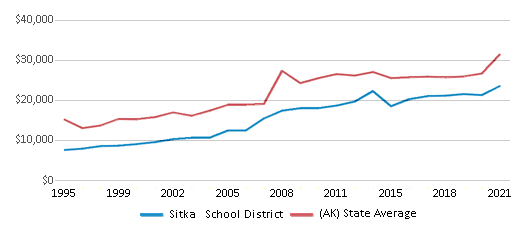
Best Sitka School District Public Preschools (2025)
School
(Math and Reading Proficiency)
(Math and Reading Proficiency)
Location
Grades
Students
Rank: n/an/a
305 Baranof St
Sitka, AK 99835
(907) 747-5825
Sitka, AK 99835
(907) 747-5825
Grades: PK-1
| 160 students
Recent Articles

Year-Round Or Traditional Schedule?
Which is more appropriate for your child? A year-round attendance schedule or traditional schedule? We look at the pros and cons.

Why You Should Encourage Your Child to Join a Sports Team
Participating in team sports has a great many benefits for children, there is no doubt. In this article you will learn what those benefits are.

White Students are Now the Minority in U.S. Public Schools
Increasing birth rates among immigrant families from Asia and Central and South America, combined with lower birth rates among white families, means that for the first time in history, public school students in the United States are majority-minority. This shift in demographics poses difficulties for schools as they work to accommodate children of varying language abilities and socio-economic backgrounds.





